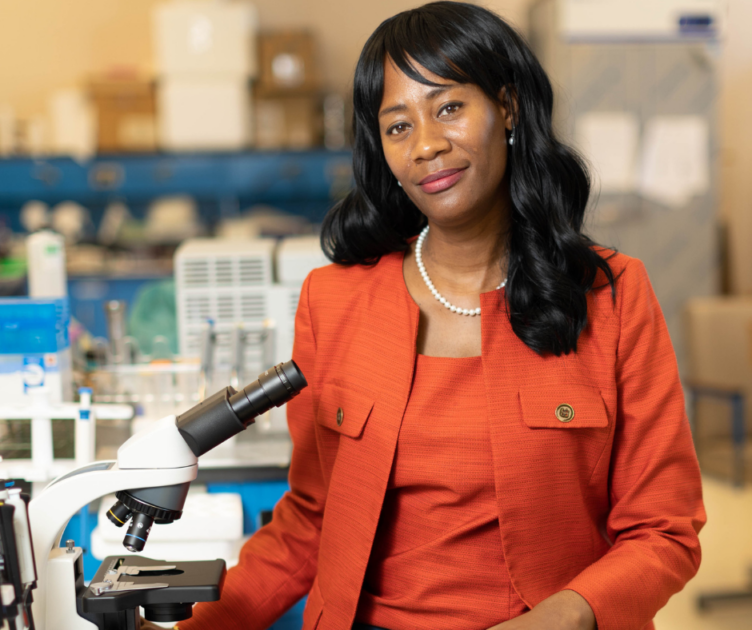Dr. Ero-Johnson serves as the Dean of the School of Science and will bring scientific and academic expertise to the taskforce
Hampton, Va (November 22, 2024) – Virginia Governor Glenn Youngkin recently announced a new Artificial Intelligence (AI) task force as called for under Executive Order 30. The Task Force includes ten of the most prominent AI experts in the Commonwealth, drawn from Virginia educational institutions, non-profits, and private corporations.
The Task Force volunteers will provide advice to policymakers as they build on Virginia’s strengths to make it a leader in the AI space while erecting appropriate guardrails to ensure responsible use of the technology. It’ll also offer input to state agencies on using AI to enhance their operations while ensuring that the AI solutions they adopt are cost-effective.
Elevating Ethical Leadership in Science and Technology
Hampton University’s Dean of the School of Science Dr. Isi Ero-Johnson has been appointed to the force. The Task Force will meet at least twice per year and offer input to both the executive and legislative branches on the Policy Standards, IT Standards, and Education Guidelines issued under Executive Order 30. And it’ll provide input on existing and contemplated uses of AI by state agencies, ensuring that agencies are maximizing return on investment and identifying promising AI uses that might be adopted statewide.
The rapid rise of artificial intelligence (AI) is likely the most important economic development of the 21st century to date. AI is already creating enormous business opportunities and changing the way the private and public sectors operate. As the home of the largest concentration of data centers in the world as well as leading research universities, major military bases, and world-class corporations, the Commonwealth is well-positioned to lead the nation in AI development. Concurrently though, AI can be misused in a way that undermines privacy and leads to unfair or inefficient outcomes.

The Task Force’s input will help the Commonwealth ensure that its AI policy remains up-to-date and responds to new developments in this rapidly developing space. By positioning itself as a leader in this critical new industry, Virginia is building on its status as America’s top state for business and enhancing the lives of its citizens.
This prestigious appointment highlights Ero-Johnson’s expertise and Hampton University’s commitment to academic excellence and leadership in addressing critical scientific challenges. As a seasoned scholar and administrator, Ero-Johnson has spearheaded groundbreaking research and initiatives that advance science, technology, and innovation. Her leadership has been instrumental in elevating Hampton University’s School of Science as a hub for cutting-edge education and discovery.
“As a member of the Governor’s Artificial Intelligence (AI) Taskforce, I’m honored to be able to provide insights into the future and current roles of AI in higher education,” Ero-Johnson said. “Hampton University has long discussed technology, its transformation, and its use within the classroom to include forms of generative AI, such as ChatGPT and more. I’ll be bringing aspects of these types of discussions and more with our faculty into the advice that we bring to policymakers as they continue to elevate Virginia in the AI space.”
Ero-Johnson earned a B.S in Biology at Jackson State University. She completed her M.S at Jackson State University, and her thesis research in the Life Sciences Division at Lawrence Berkeley National Laboratory. She attained her Ph.D. in Interdisciplinary Studies in Biological Sciences and Science Education at Vanderbilt University. She has authored and co-authored papers in peer-reviewed science and education journals that include Journal of Biological Chemistry, Nature Chemical Biology, Journal of Chemical Biology, and Journal of Research in Science Education.
Advancing AI in Higher Education and Beyond
In the world of higher education, the use of AI expands beyond student usage. AI can potentially be implemented to assist scientific programs in the area of research by helping to process vast amounts of data quickly, helping students and researchers identify trends, correlations, and patterns that might otherwise be missed. Machine learning algorithms can predict outcomes in fields like climate science, biology, and chemistry, enabling more informed experimentation. AI tools can also identify areas where students are struggling and suggest targeted resources or exercises to improve.
“Hampton University stands at a pivotal moment in the evolution of science and technology,” said Hampton University President Darrell K. Williams. “We are committed to leading the charge in advancing HBCU participation in the global dialogue on artificial intelligence. I am inspired by the innovative vision Dr. Ero-Johnson brings to the task force and eagerly anticipate how her leadership will drive transformative ideas that not only shape the future of the Commonwealth but also redefine the role of AI in the classroom, placing it at the core of the academy.”
When used appropriately and ethically, AI can enhance educational settings and strengthen operations as well as academic processes. Hampton University is thrilled to be involved in efforts to assist the Commonwealth’s understanding of AI. The University will continue to explore the ways in which AI can be utilized effectively and ethically on campus.
Elevating Hampton Excellence
Hampton University’s Elevating Hampton Excellence initiative is a bold, 10-year strategic plan designed to advance academic rigor, spark innovation, and deepen community impact. Rooted in Hampton’s legacy of excellence, this transformative effort seeks to expand educational opportunities, drive pioneering research, and empower students to lead boldly in their chosen fields. At its heart is a commitment to reimagining education through cutting-edge programs, fostering breakthrough discoveries, and forging strategic partnerships with industry leaders. By focusing on securing patents, advancing STEM innovation, and addressing global challenges, Hampton is positioning itself as a leader in shaping the future of science, technology, and society.
This initiative emphasizes creating an inclusive environment where every student can excel while advancing social mobility and community uplift. By unlocking the collective potential of its students, faculty, and alumni, Elevating Hampton Excellence embodies Hampton’s mission to transform lives and build a legacy of global impact. Through visionary leadership, innovation, and collaboration, Hampton University is redefining what’s possible in education and research, ensuring its place as a trailblazer in empowering the next generation of leaders and change-makers.
About Hampton University
Hampton University, nestled along the scenic shores of Hampton, Virginia, is a dynamic historically Black institution with a storied legacy of academic excellence, pioneering research, and dedicated community service. Here, students discover an empowering environment that fuels their ambitions, nurtures their potential, and inspires them to rise, lead, and excel.
Founded in 1868, Hampton combines a robust liberal arts education with a strong emphasis on scientific and professional disciplines, offering a wide range of distinctive programs, including leading-edge degrees in STEM, business, arts, and health sciences. The University is at the forefront of research in areas such as atmospheric science, cancer treatment, and cybersecurity, driving innovation that impacts the world. Additionally, the newly launched School of Religion stands out as the first HBCU to offer a doctoral degree in theology, religious studies, and ministry. Contributing $530 million annually to both the regional and the Commonwealth of Virginia’s economy, Hampton plays a vital role in regional development while championing diversity, inclusion, and opportunity.
Recognized by Money Magazine as one of the “Best Colleges in America” and honored by Coastal Virginia as the “Best Private College,” Hampton University is a close-knit community of learners and educators representing 44 states and 32 territories and nations. Committed to nurturing intellectual curiosity, critical thinking, and global citizenship, Hampton prepares its students to lead and thrive in an evolving world. For more information, visit www.hamptonu.edu.
For media inquiries, please contact Mahogany Waldon in the Office of University Relations, at mahogany.waldon@hamptonu.edu or 757-727-5987.
![]()
